Part I: « Казань – историческая» [The Historical Kazan’] Posted by josefina on May 9, 2010 in Culture, History, Russian life, when in Russia
«С днём победы» [Happy Victory Day], everyone! Because Yelena has already taken care of the celebration of this holiday for me (see the last post by her on our blog), today I’m going to share with you all some of my impressions on «Казань» [Kazan’]. That’s where I’ve been hiding during the past week (hence I haven’t been around to approve nor answer your comments, but I’m working through them! Excellent as always! Thank you!). Because Kazan’ made a huge as well as varied impression on me (entirely positive, though) I have decided to divide my impressions of «замечательная, прекрасная, незабываемая Казань» [the wonderful, beautiful, unforgettable Kazan’] into three categories, or three parts. Part I (that’s today’s post) I’m calling «Казань – историческая» [The Historical Kazan’], even though that title far from says it all. It should probably be called «Казань – обзорная» [Kazan’ – an overall view] instead, but I think the current title works just fine. Part II (that’s for tomorrow) has the curious title of «Казань – ленинская» [Lenin’s Kazan’]. For it I used the adjective made from his last name rather than calling it – which would have been more appropriate – «Казань Владимира Ильича Ленина» [Vladimir Il’ich Lenin’s Kazan’]. The last and III part (to be posted on Tuesday) is named «Казань – литературная» [Literary Kazan’] and focuses mainly on how to pursue a walk in the footsteps of great literary figures in this magnificent town. This is not entirely easy done; thus I advice you, dear readers, to either а) print out that post and study it carefully before coming to Kazan’; or б) not to be bothered but leave it to «авось повезёт» [maybe (I’ll) get lucky]. That’s enough for an introduction, now straight onto Part I: «Казань – историческая»!
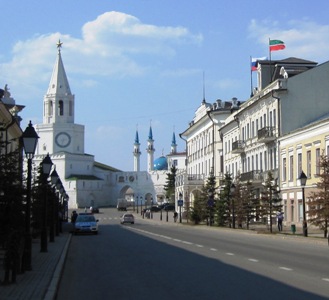
A view of the entrance to the «Кремль» [masc. Kremlin] from «улица кремлёвская» [Kremlin Street]. In front of the entrance is the «площадь 1 (первого) мая» [1st of May Square]. Do note the two flags above the building to the right – those are «флаг Российской федерации» [the flag of the Russian Federation] and «флаг республики Татарстана» [the flag of the Republic Tatarstan]. Maybe you can even see magnificent blue towers of the «мечеть» [mosque] rising up behind the white Kremlin walls?
«Казань – столица Татарстана» [Kazan’ is the capital of Tatarstan] and the heart of the capital is, of course, «казанский Кремль» [the Kazan’ Kremlin]! Note that the city itself – «Казань» is feminine, thus you have to adapt the adjective when saying «красивая Казань» [the beautiful Kazan’], but «Кремль» [Kremlin], also ending on ‘the soft sign’ is masculine so the correct way to praise it would be: «красивый Кремль» [the beautiful Kremlin]. It is really a very beautiful place; since 2000 it is on UNESCO’s list of places to be preserved as world cultural heritage. What can one find inside of it, then? Well, there’s «губернаторский дворец» [the governor’s palace], where the president of Tatarstan has his office now (and where Putin dropped in for a short visit while I was in Kazan’, causing the entire Kremlin to be surrounded by police and visitors to be searched thoroughly with metal detectors). There are several museums worth visiting inside the Kremlin, among which can be noted «музей Ислама» [the museum of Islam] and «музейно–мемориальный комплекс «История государственности татарского народа и республики Татарстана» [Memorial Museum-Complex “History of the nationality of the Tatar People and the Republic of Tatarstan]. But most people go to the Kazan’ Kremlin to see something else: the Islamic «мечеть Кул–Шариф» [Mosque Kul-Sharif] standing only hundred meters from the Orthodox Christian «Благовещенский собор» [Cathedral of the Annunciation]. Their locations so close to each other within one and the same Kremlin in Kazan’ isn’t purely symbolical – it is a clear statement of tolerance that can be felt everywhere else in this city.
First you should have a look at the «мечеть Кул–Шариф» [Mosque Kul-Sharif]…
…and then walk right over to glance at the «Благовещенский собор» [Cathedral of the Annunciation].
Already on the train from Yekaterinburg to Kazan’ – as soon as we had entered into «Башкирия» [Bashkiria] (also a largely Muslim part of Russia) I saw a clear difference in the landscape outside the window. Suddenly there was at least one «мечеть» [fem. Mosque] in every village and everything was almost as suddenly clean! I shared this my observance with a fellow passenger – a very pretty «татарка» [Tatar girl] from my region (Sverdlovsk Region) studying in Kazan’ – and she said dryly: «Да, русские чистотой и порядком не особо отличаются…» [Yes, Russians aren’t particularly notable for their cleanness and order…]. Of course, this doesn’t mean that all Russian villages are dirty and suffering from general disorder – but simply that most villages with a large Muslim population in Russia are cleaner and more ordered. The same goes for the city of Kazan’, where the population isn’t all Muslim and not only «татары» [Tatars] live – though it is considered by them «родина татаров» [the native land of the Tatars] (which is not grammatically correct in Russian, it should be «родина татар», but the Tatars themselves seem not so concerned with using correct Russian grammar in this particular case). Kazan’ has just as large a part of the population which is Orthodox Christian or Jewish. Here in Yekaterinburg you don’t see women in scarves very often on the street; in Kazan’ I think at least every tenth woman had her hair covered inside a beautiful silk scarf. And I saw just as many Christian crosses on people’s necks in Kazan’ as I saw the Jewish sixth edged star of David or the Islamic moon and star (I’m sorry I don’t know what to call these two last symbols in a politically correct way in English, that’s why I’m writing them as they seem to me). That’s not so common here in Yekaterinburg, and in the end I almost wanted to buy such necklaces for myself because they were simply so cute – not to mention that the jewelry stores of Kazan’ have enormous selections of all these three religious symbols! But as to not confuse people around me I left with the same tiny silver protestant cross inside a drop (symbolizing baptism in the Swedish Lutheran Church) that I had arrived with… I asked around when I was in Kazan’ to see if my impression of the city was correct: is this really such a tolerant place as it seems to be in my eyes? I even asked a fellow foreign student (from Nigeria) about this – after he told me he’s Catholic – and he said that yes, in Kazan’ you’re allowed to practice any religion that your heart and soul tell you to. He also told me that race crimes are very rare in Kazan’ and that he has never – during his four years there – been a victim of race prejudice. Now that’s something extraordinary to hear about a Russian town in the early 21st century…
In Kazan’ «двуязычие» [bilingualism] flourishes: the two main languages here are «русский язык» [Russian language] and «татарский язык» [Tatar language]. Here’s a poster about the (then) upcoming Victory Day inside the Kremlin in two languages.
Going to Kazan’ actually felt to me like I had gone abroad. I know that might sound very weird, for Kazan’ (according to the map but I don’t always carry a map of the world around with me so I didn’t really feel this location) is still within and very much a part of the Russian Federation. Maybe it was because of the constant «двуязычие» [bilingualism] everywhere in the city: all the street signs as well as all other signs on buildings and the like were written both «по–русски» [in Russian] as well as «по–татарски» [in Tatar]. In Kazan’ they even announce the stops on the bus both «по–русски» [in Russian] and «по–татарски» [in Tatar]! The whole Kazan’ experience felt to me a bit exotic. The weather could have had something to do with it: during my entire stay it was sunny and around 30 degrees above Celsius. So you can imagine my amazement at the Kazan’ summer heat after leaving a still early and humble spring in the Urals after 14 hours on the train – to find all the trees suddenly green…
A view of Kazan’ from the thirteenth floor of «Казанский государственный университет» [Kazan’ State University] – can you spot the river «Волга» [Volga] in the background? Yes, for the first time in my life I finally saw the mighty «Волга» with my own two eyes! Now the Russian only river I really want to see before I die is «Дон» [Don]…
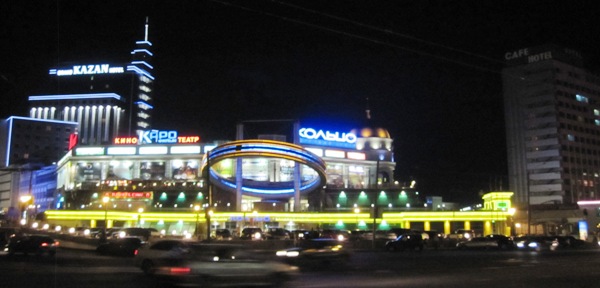 And last but not least: «Казань – ночная» [Kazan at night]!
And last but not least: «Казань – ночная» [Kazan at night]!
P.S. Okay, so the real reason as to why I went to Kazan’ in the first place was to make a presentation about some of my scholarly research on Shalamov on a conference at the Kazan’ State University – «Синтез документального и художественного в литературе и искусстве» [“Synthesis of Documentary and Artistic in Literature and Art”] – a conference that turned out just as lovely as the city of Kazan’ itself!

Build vocabulary, practice pronunciation, and more with Transparent Language Online. Available anytime, anywhere, on any device.



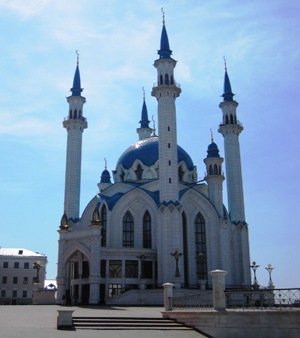
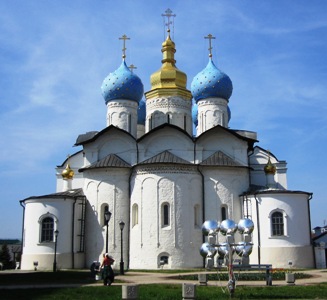
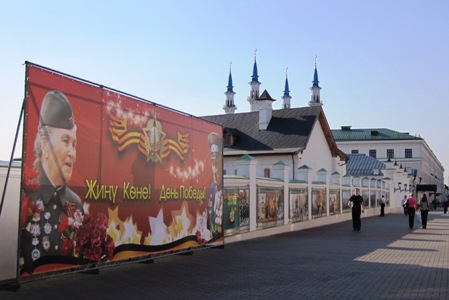
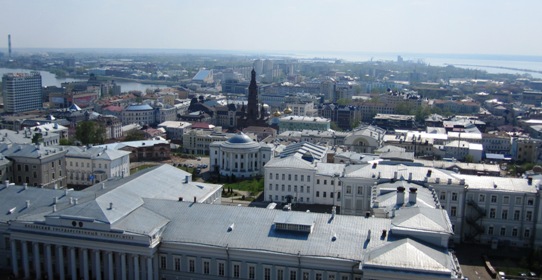

Comments:
Valentine:
You used to come in once or twice a month, now you arrive at my inboc every week, once or twice. Why the sudden rush to more of your blog. Its overwhelming , unless you are now edited by another person. Please inform.
josefina:
Hi Valentine! I know nothing about how and how often you recieve our posts in the form of e-mails, but while I was the sole blogger here I always wrote at least 5-8 times a month. Now of course there’s Yelena (with 4-6 posts per month), which does increase the flow 🙂 But I think that’s a good thing! If you get overwhelmed, then don’t read them all at once! Pace yourself and read only the ones you find interesting!
Katie:
I just thought I’d say that I love this blog! I just stumbled by it while doing some research for a Russian literature paper and I nearly didn’t finish the paper because I was so distracted by reading through all of the posts. I also picked up quite a few new Russian words along the way, which is really nice because I’m not in Russian language classes anymore and I’m very quickly forgetting the very little that I had learned.
Good work!
Charly:
Oh, but there can’t be too much of a good thing – as long as it’s an excellent blog. 😉
Great post – now I really want to visit Kazan’!
Vanessa:
I used to have a roommate from Kazan, but I didn’t know much about that city until now. I love reading this blog, and thanks for the informative post!
Jen:
Josefina, I haven’t even read this post yet, but thank you so much for writing it! Kazan is my favorite city in the world, so I love seeing new perspectives on it.
Ellie:
Thank you so much for writing about Kazan. I’m originally from Tatarstan, but I moved out of country when I was 10. Though I don’t visit very often, it still has a very special place in my heart. I’m trying to get TL to add Tatar to the list of languages….I hope some day it will happen! 🙂
Russian Sphinx:
Architecture of the cathedral and mosque are a bit similar.